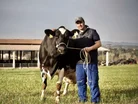How is Danone Eradicating Methane Emissions from its Dairy?

When you think of greenhouse gases, it’s unlikely that methane immediately springs to mind. However if the agricultural sector is going to mitigate its impact on global warming, it needs to be.
As a potent greenhouse gas, methane's impact on global warming is significantly higher than carbon dioxide in the short term, with agriculture contributing nearly half of all human-caused methane emissions.
Livestock and rice cultivation are the primary culprits within the farming industry and as the global population approaches 10 billion people, addressing these emissions has become imperative.
- Methane is 84 times more powerful a greenhouse gas than carbon dioxide when measured over a 20 year period.
- Livestock emit approximately 30% of worldwide anthropogenic methane, with dairy cattle generating half of those emissions.
Methane mitigation technology company Ambient Carbon is partnering with Benton Group Dairies to field-test a prototype of Ambient Carbon’s Methane Eradication Photochemical System (MEPS). Danone North America sources milk from Benton and has entered a MoU as part of the project.
The technology is a first-of-a-kind and, crucially, non-invasive way to remove methane from dairy barn exhaust and therefore lower farming’s methane emissions.
The first step is installing methane monitors at Benton’s dairy farm in Ambia, Indiana before installing and testing a MEPS field prototype in early 2025.
“Benton Dairies places a substantial emphasis on conservation,” says Chris Williams, Conservation Lead at Benton Dairies.
“We are committed to increasing our positive environmental influence while reducing greenhouse gas emissions. MEPS is a non-invasive technology that will remove more methane from our farms than any available technology we’ve encountered.
“We are excited to work alongside Ambient Carbon to push the boundaries of what sustainable milk production can be.”
Meet Ambient Carbon
Denmark-based Ambient Carbon was founded in 2017 with a mission to develop and commercialise effective, safe and scalable technologies that mitigate greenhouse gas emissions.
“We believe that by 2030, Ambient Carbon will be eliminating well over one gigaton of CO₂ equivalent annually by destroying methane from dairy barns and other low-concentration methane sources such as wastewater treatment plants and biogas plants,” says David S. Miller, Ambient Carbon’s Co-Founder and COO.
What is Ambient Carbon’s Methane Eradication Photochemical System (MEPS)?
In short? MEPS is a point-source methane removal system that significantly reduces the amount of methane from dairy cows and other point sources getting into the ambient air.
In slightly longer? Ambient Carbon says that it is the only scalable, cost-effective solution for eradicating low-concentration (non-flammable) methane from cattle and manure, as well as other point sources.
The technology uses a patented gas-phase photochemical process that combines chlorine atoms and UV light in a reaction chamber, mimicking a natural process of methane destruction in the atmosphere.
MEPS breaks down methane at its source in the dairy barn, preventing its release into the ambient air. The chlorine atoms are generated onsite via electrolysis of saltwater, and after eradicating 80-90% of the methane, the chlorine is recycled in a closed system.
“We have found that chlorine is the Achilles heel of methane,” says Matthew Johnson, Co-Founder and CSO of Ambient Carbon.
“MEPS only requires salt water (sodium chloride) and UV light to break down methane. It operates at ambient temperatures, so it is safe, and it’s automated, efficient and highly cost-effective. Methane mitigation technologies such as regenerative thermal oxidation operate with expensive catalysts at high temperatures and aren’t cost effective for the relatively low concentrations of methane in a dairy barn.
“MEPS has world record efficiency for the low concentrations found in agriculture and waste management. Field-testing MEPS in Indiana will showcase its advantages and give us data showing just how efficient and cost-effective MEPS will be for dairy farms. MEPS is located outside the barn and doesn’t disturb dairy operations.”
MEPS: Reducing emissions in Denmark and beyond
Ambient Carbon is working to reduce methane emissions beyond the US, with ambitious plans to ramp-up its solutions and make a significant contribution to lowering greenhouse gas emissions in the next five years.
Alongside the field-test with Danone and Benton Group Dairies, Ambient Carbon is testing another MEPS field prototype in Denmark as part of the AgriFoodTure PERMA Project. The project includes Northern European dairy cooperative Arla and is funded by Innovation Fund Denmark and the EU’s NextGenerationEU.
The unification of the two field tests in Indiana and Denmark will be used to prepare MEPS for full-scale pilot testing in late 2025 before commercialisation and wider installation in 2026.
Receive the next edition of ClimateTech Magazine by signing up for its newsletter.
As part of this portfolio, make sure you check out Sustainability Magazine and also sign up to our global conference series - Sustainability LIVE.
Also check out our Sister Brand, Energy Digital.

